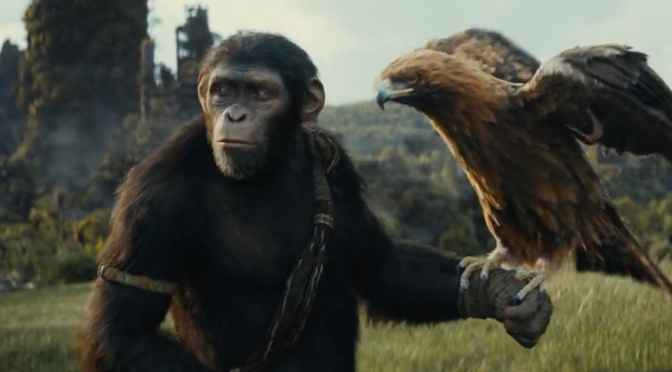Three hundred years have passed since we last visited the Planet of the Apes. It feels like the past. In the real world, Andy Serkis’ Caesar has been fading from the planet for seven years, and his team of noble apes have just arrived at the paradise oasis. The legacy of Sekis and his fellow chimps figures prominently in The Kingdom, the fourth film of the reboot era. The apes have progressed to a shockingly high standard, and they’ve never seen or used anything better. Meanwhile, humans have regressed. You’ll decide which side of the screen to be on.
Compared to Matt Reeves’ previous film, The Kingdom focuses on characterisation and narrative padding at a more sedate pace. That’s a credit to new director Wes Ball, who made a name for himself with the Moving Maze series, and screenwriter Josh Friedman, who learnt more about style than substance from James Cameron, and he’s clearly been rewarded. That’s not to say The Kingdom is completely weightless. No, it’s just that the film gives the overwhelming sense that the best is yet to come. If successful, The Kingdom will be the first in a new trilogy, each of which will bring the story closer to Franklin J. Schaffner’s 1968 original, which was based on Pierre Boulle’s novel. As things stand, 25 November 3978 is still a long way off.
Language is no longer a rarity among apes – Caesar’s “No!” has become a distant memory. had become a distant memory – but their civilisation was simple. The reference points seem to be paganism and native culture. They had elders, hierarchies and rights of passage. Meanwhile, a great deal of time and energy is devoted to the training of the Eagles, an idea conceived for effect rather than contextual logic. In Sekis’ absence, Owen Teague plays Noah, a wide-eyed chimpanzee eager to impress and confident in the system. It’s a notoriously familiar plot, exacerbated early in the film by Noah’s youthful uncertainty, only to be hardened by his experiences outside of training camp. Caesar’s fondness for humanity stems from the potential he sees for good. Gent contemplates how different the story would have been if it had played out in reverse.
In any case, War Rising’s formula remains largely the same here. There are good gorillas and bad gorillas; good guys and bad guys. Accordingly, the corrupt gorillas are visually rougher, while the decent ones have deep eyes and soft features. Peter Macon’s Raka, a Bornean orangutan who lives his life in the old-fashioned way, has an underutilised sense of joy, while Kevin Durand’s tyrannical bonobo, Proximus Caesar, is wickedly appropriate, his interest in human history reminiscent of a recent modelling. As it turns out, bonobo monarchs cared more about the Roman Empire than the average 21st-century person.
As for the humans, Freya Allen’s May is an interesting representation. The development of her expected bond with Noah has a slight impact on the viewing, but what really matters is her influence on the second and third films. Bauer’s directive is to inject moral ambiguity into a dynamic that was previously largely clear. To that end, The Kingdom stumbles and overestimates the audience’s willingness to put viewing on hold in anticipation of something more vivid. Whether or not this film will leave people fervently craving more remains to be seen. Nonetheless, the appeal of the film series is undeniable. No other film lets you see an ape ride a horse.
Of course, what really sets it apart is its visuals. The world of The Kingdom is a feast for the eyes – lush, vast and exciting to explore. In an era of climate crisis, there’s a grim fascination with
